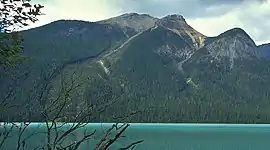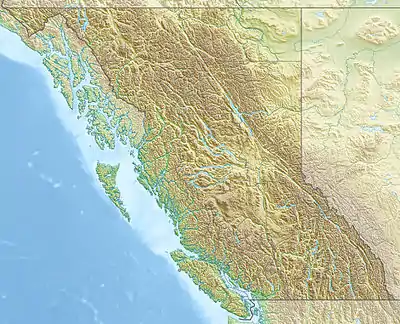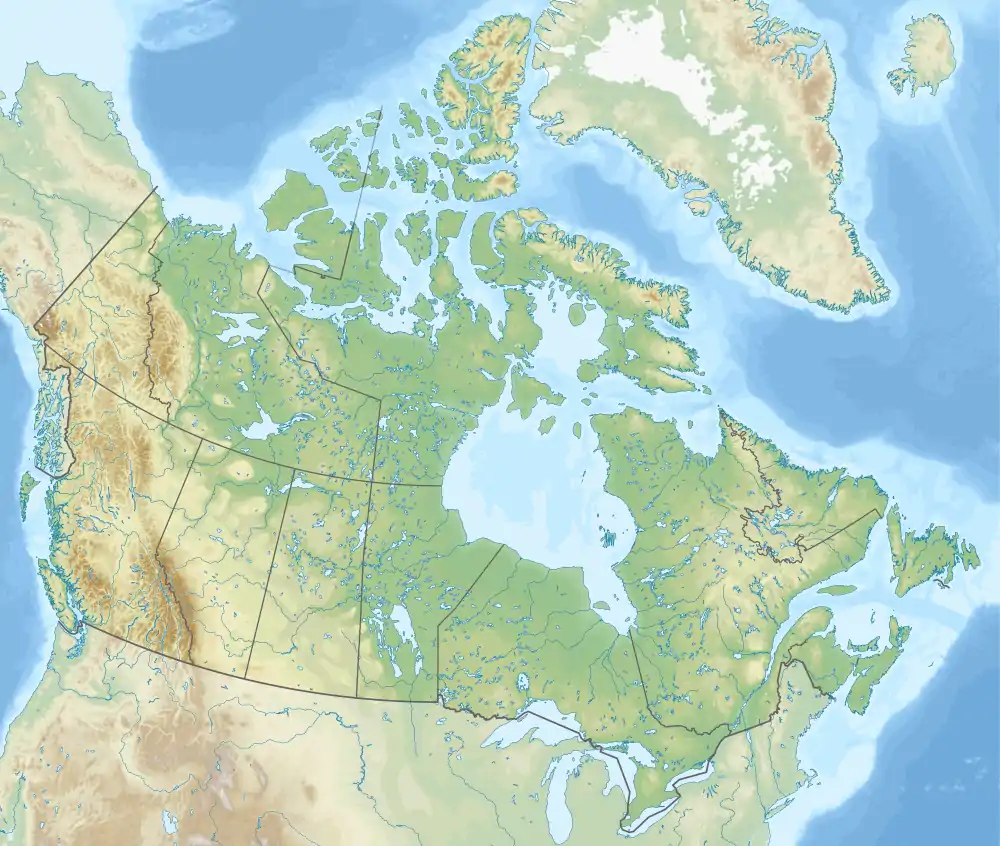Emerald Peak (Yoho)
Emerald Peak is a 2,701-metre (8,862-foot) mountain summit located in Yoho National Park, in the Canadian Rockies of British Columbia, Canada. Its nearest higher peak is Mount Carnarvon, 1.7 km (1.1 mi) to the northwest.[2] Both are part of the President Range which is a subset of the Waputik Mountains.[2] Emerald Peak is visible from Emerald Lake, rising 1,256-metre (4,121-foot) above the northwest shore. The mountain's name was officially adopted in 1924 when approved by the Geographical Names Board of Canada, in association with Emerald Lake, which in turn was named in 1900 on account of its color.[3][4]
| Emerald Peak | |
|---|---|
 Emerald Peak seen from Emerald Lake | |
| Highest point | |
| Elevation | 2,566 m (8,419 ft) [1] |
| Prominence | 166 m (545 ft) [1] |
| Parent peak | Mount Carnarvon (3046 m)[2] |
| Listing | Mountains of British Columbia |
| Coordinates | 51°27′35″N 116°34′13″W [3] |
| Geography | |
 Emerald Peak Location of Emerald Peak in British Columbia  Emerald Peak Emerald Peak (Canada) | |
| Location | Yoho National Park British Columbia, Canada |
| Parent range | President Range Canadian Rockies |
| Topo map | NTS 82N/07[3] |
| Climbing | |
| Easiest route | Scramble |
Geology
Emerald Peak is composed of sedimentary rock laid down during the Cambrian period. Formed in shallow seas, this sedimentary rock was pushed east and over the top of younger rock during the Laramide orogeny.[5]
Climate
Based on the Köppen climate classification, Emerald Peak is located in a subarctic climate with cold, snowy winters, and mild summers.[6] Temperatures can drop below −20 °C with wind chill factors below −30 °C. Precipitation runoff from Emerald Peak drains into the Emerald River, which is a tributary of the Kicking Horse River. The months July through September offer the most favorable weather for viewing or climbing Emerald Peak.
References
- "Emerald Peak, British Columbia". Peakbagger.com. Retrieved 2019-08-21.
- "Emerald Peak". Bivouac.com. Retrieved 2019-03-24.
- "Emerald Peak". Geographical Names Data Base. Natural Resources Canada. Retrieved 2019-03-24.
- "Emerald Peak". BC Geographical Names. Retrieved 2019-08-21.
- Gadd, Ben (2008). Geology of the Rocky Mountains and Columbias.
- Peel, M. C.; Finlayson, B. L.; McMahon, T. A. (2007). "Updated world map of the Köppen−Geiger climate classification". Hydrol. Earth Syst. Sci. 11: 1633–1644. ISSN 1027-5606.
External links
- Weather: Emerald Peak
- Parks Canada web site: Yoho National Park
- Emerald Peak climbing photos: On-Top